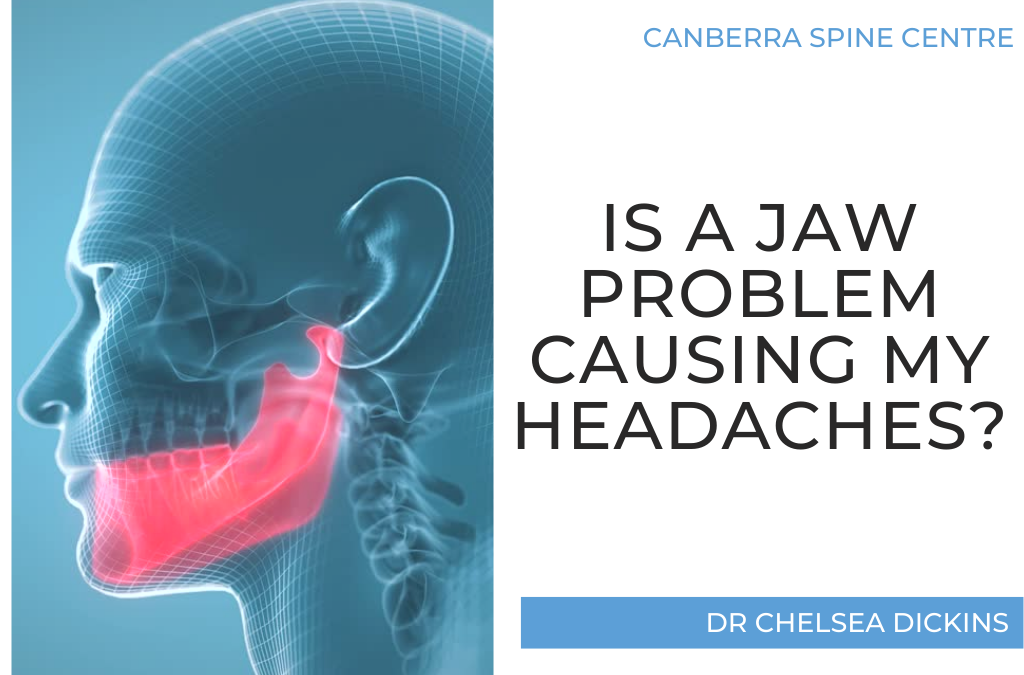
Headaches are one of the most common, and irritating conditions we suffer, with around 15 per cent of Australians taking pain-relieving medication for headache at any given time.
It’s no wonder that we see so many people with headaches at Canberra Spine Centre.
Headaches have a variety of causes. What you may not realise, is that the jaw is a common cause of headache, often missed by health care professionals.
In this article, you’ll learn more about the relationship between the jaw and headaches, and what you can do about them.
What’s the TMJ?
Temporomandibular Joint (TMJ) dysfunction is a really common term that gets thrown around when describing jaw pain.
The jaw itself is comprised of the mandible (bone), two joints with discs just in front of the ear and many muscles involved in its movement of opening and closing.
These joints get used almost constantly with chewing, talking, facial expressions, yawning and for some, clenching and grinding. With just our regular day to day activities this is a lot of movement for our jaw.
Other common irritants of the jaw is overextending on a big burger, or having your mouth open for a longer than usual time, such as at the dentist.
Stress, Clenching and grinding
Our minds are approximately 95% subconscious action. Many of our worries play out constantly in the background, building up unconscious stress that is then expressed as increased muscle tone – jaw clenching being one example.
Stress is a huge driver in clenching and grinding of our jaw and teeth. Clenching happens predominantly during the day and grinding at night.
Jaw issues, like most musculoskeletal problems, build over time, and tend to have chronic underlying causes.
Constantly clenching and grinding often stems from childhood. The major muscles that are used are masseter (outside the jaw), temporalis (you guessed it, at your temple) and the pterygoids (deeper, inside the mouth and jaw).
How does the Jaw Cause Headaches?
Headaches can refer from the jaw and the muscles of the jaw when they are overused. There are 2 muscles in the jaw that can become so hypertonic (tight) that they signal pain to refer in the form of a headache.
‘Referred Pain’ means that while the source of the pain is the muscle, messages have become scrambled at the spinal cord level, and you feel it somewhere else – in this case, your head.
Ultimately, any pain means that your body is communicating that the problem is getting worse, and something needs to change. Those two muscles are the temporalis and the masseter.
How do Chiropractors assess your jaw?
Chiropractors are trained professionals, qualified to properly assess your jaw.
As a chiropractor that really enjoys assessing this function, I’ll be looking for your jaw function when we speak to each other.
The position of your jaw is really important for its function, and that of surrounding structures. A chiropractor will assess the movement of the jaw, tension of muscles around the jaw and even the positon and movement of the cranial bones that the jaw needs to fit into.
All of this information will give your chiropractor the necessary information to diagnose and manage your condition.
Can I check my own jaw function?
You can try this yourself. In the mirror, slowly open your jaw and look for movement side to side.
Does it open straight, left curve, right curve or zig zags side to side? This information will tell me when the TMJ is getting stuck or limited from muscle tightness.
If the jaw is going straight, then it could be tight on both sides but limited in how far its opening. Ask one of the chiropractors at Canberra Spine Centre if you notice anything after you give this a go.
Chronic grinding
Chronic grinding is obviously not great for your jaw or your teeth long term. Addressing the stress and the cause is going to super important for a long-term solution, but a short term solution of a mouth guard or splint should also be considered.
A mouth will give a barrier between your teeth to damage less and will often decrease the clenching overnight too.
This is because of an object in your mouth, it brings better awareness to the area helping your subconscious be more aware of this region of your body.
The long-term solution of stress management, habit correction and mindfulness around your jaw function will be key to reducing the stress on your jaw and reduction in the headaches from the overuse of these muscles.
How we help as chiropractors
The function of the neck is hugely important in the function of the jaw. In particular, C1, your first vertebrae in the neck has a strong relationship with the movement of the TMJ.
Our chiropractic neck adjustments are also shown to regulate the muscles of the face and jaw to decrease tightness.
We also address the jaw through adjusting the TMJ joints themselves and doing muscle release work. Exercises and home massage are other fabulous management tools to get this joint functioning at its best.
For more information on TMJ and headache referral or to book a consultation please call us on (02) 6257 9400.
If you would like some more information about the spine and nervous system and how it relates to your health, please check out the other articles on our Facebook page or go to our website: www.spinecentre.com.au
